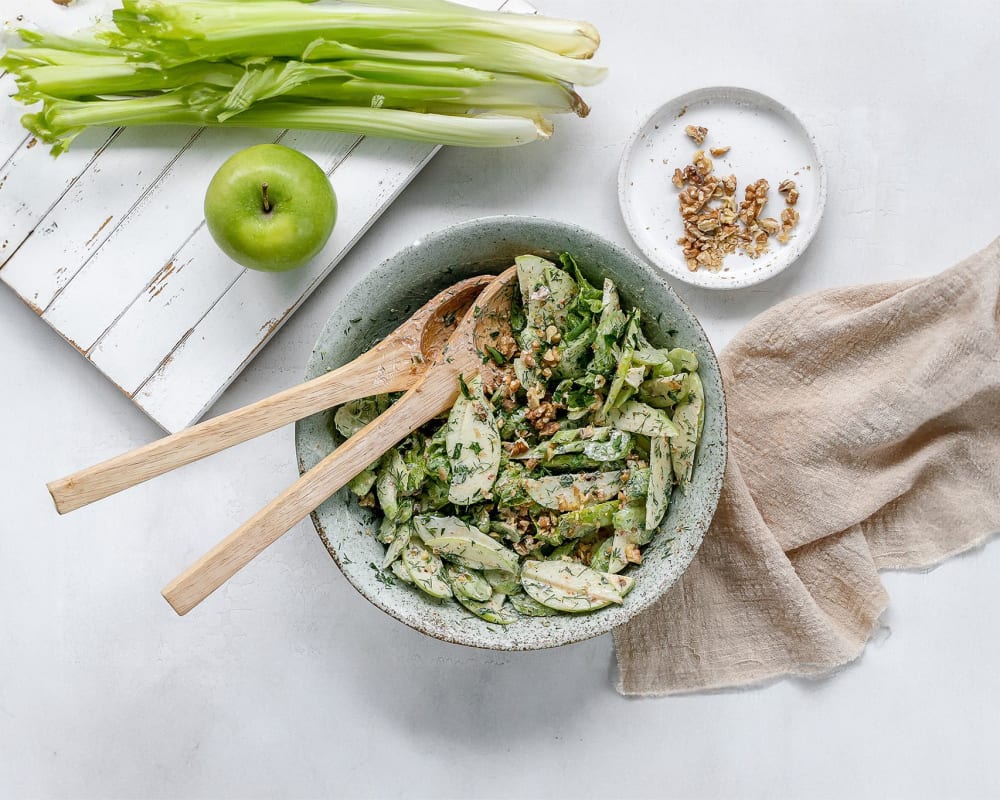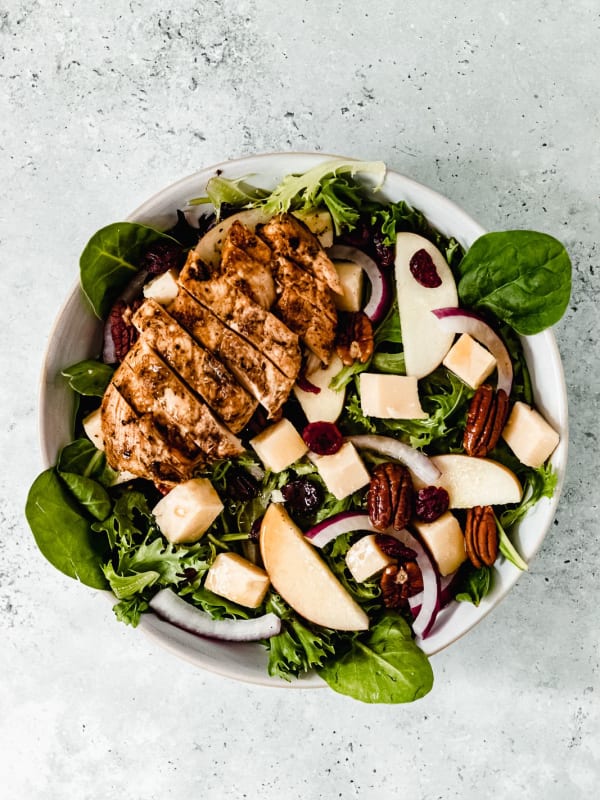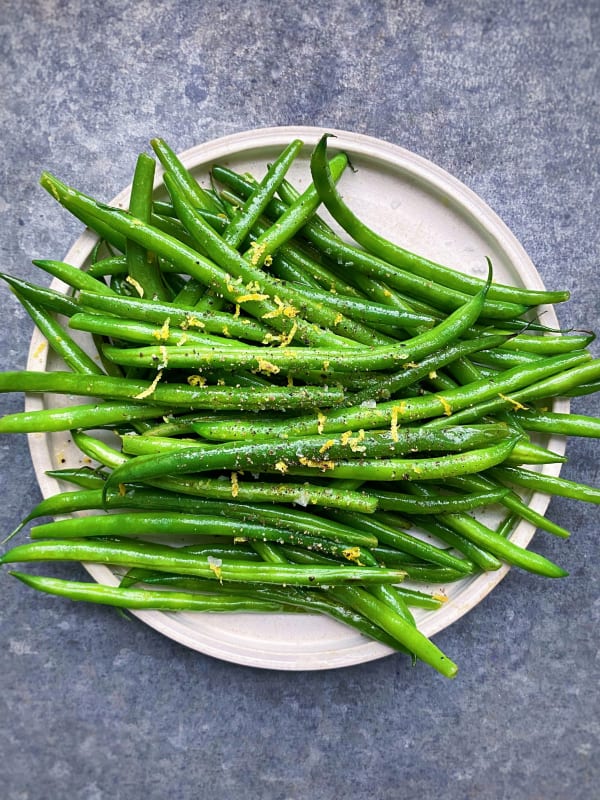Popular Conditions & Diets

At the crossroads of the produce aisle, choosing between organic and conventional options is a common conundrum. The allure of deeper flavour, reduced pesticides, supercharged health benefits, and overall natural feel can appeal to us on a deeply human level.
Who doesn't want to eat nutritious, uncontaminated food as Mother Nature intended? But, staring back and forth between a $10 certified organic cauliflower and its cheaper conventional counterpart, we might reasonably ask: is it worth it? And lately, voices on the internet are asking an even more severe question: is it even any better at all?
As the organic food market has evolved significantly, with major corporate players entering the scene, it's essential to understand what "organic" really signifies and whether it lives up to the hype. In this article, we'll examine the nature of certified organic farming, the ongoing debate over nutritional superiority, and concerns around pesticides, contamination, and more.

To be eligible for the process of becoming certified organic, farms must not have used synthetic pesticides, herbicides, or fertilizers for three years before harvest, and there must be ample space buffering adjacent conventional farms to avoid contamination. Additionally, organic farms must be free from genetic engineering (GMO), radiation, and the use of sewage as fertilizer.


Both types of farming use pesticides, but organic uses non-synthetic pesticides and conventional uses synthetic. And, both types have toxic potential: some organic pesticides have even found themselves banned by the USDA and European Union, such as Rotenone. Although initially popular for its natural origin, studies later revealed that exposure to high levels of Rotenone in rats and pose significant risks to humans as well.
When comparing conventional and organic produce, one significant difference lies in the potential for heavy metal contamination - particularly cadmium. Accumulations of cadmium in food or in the body can have nasty consequences ranging from kidney toxicity and weak bones to cancer, and for non-smokers, diet is the main source of exposure.
Conventional agriculture often uses cadmium-containing fertilizer, depositing the metal directly into the soil. Low levels of organic matter in the soil can further increase cadmium uptake by crops. Since organic farms generally have richer soil, this may be another advantage regarding potential cadmium contamination.
But at the end of the day, does organic produce really have less cadmium? While some studies have revealed this to be the case, other data shows no such thing. And where differences have been observed, they . So, if you are concerned about avoiding cadmium, grains might be the place to focus on going organic. But the murky truth is that we still need more rigorous scientific inquiry before making hard and fast claims or casting any shadows of suspicion.

Created by the Environmental Working Group (EWG), the two well-known consumer guides, The Dirty Dozen and The Clean Fifteen, are meant to be trusted allies in steering you toward smarter shopping without breaking the bank. The Dirty Dozen highlights twelve fruits and veggies that are most likely to carry pesticide residues, nudging you to opt for organic versions when you can. On the flip side, the Clean Fifteen reassures you with a selection of produce that is typically low in pesticides, making them assuredly safe bets even when they're not organic.

Direct clinical evidence for the superiority of organic foods remains elusive. If you like organic and can afford it, go for it. It certainly doesn't seem to be worse for you, and it may, at times, be higher in antioxidants, and tastier.
But if not, don't worry. The main thing is to eat fruits and vegetables, whatever the sticker on them says. Because, while the science is ambiguous on the benefits of organic produce, the benefits of eating fruits and veggies are pretty clear. So, if the organic price tag translates to fewer in the shopping cart, this is a loss, not a win.
The question that's not posed enough, perhaps, is whether eating fewer organic vegetables is not only better for you than the same amount of conventional veggies, but whether it's better than eating more conventional veggies for the same amount of cash. With money being a very real factor, and very few people as they are, this seems like a salient question.
Albright, M. B. (2014, July 14). Organic foods are tastier and healthier, study finds. Cambridge University Press. https://www.nationalgeographic.com/culture/article/organic-foods-are-tastier-and-healthier-study-finds
Bailleau, R. (n.d.). Chemical Fertilisers are feeding the world - but at what cost?. FoodUnfolded. https://www.foodunfolded.com/article/chemical-fertilisers-are-feeding-the-world-but-at-what-cost
Ball, J. (2023, October 30). I’m a dietitian & I don’t usually buy organic-here’s why. EatingWell. https://www.eatingwell.com/article/7892935/dietitian-i-dont-usually-buy-organic/

Products containing 95 per cent organic ingredients or more can bear a Certified Organic seal. 'Made with organic' can be used if organic ingredients account for 70 per cent or more, which must then be listed specifically. If organic ingredients account for less than 70 per cent of the product, no claim can be made.
One great thing about organic standards is international consistency: Canada bears very similar standards to the European Union, the United States, Japan, Costa Rica, and Switzerland. But in every country, it costs money to get certified organic, and recurring application, inspection, and other annual fees to maintain a certification can add up. Organic farming is also much more labour-intensive due to things like crop rotation for soil fertility, higher livestock standards and required pesticide regulations.
Adding to the expense, marketing and distribution-chain costs are much higher for small quantities of food compared with large-scale production. Where organic labels used to conjure heartwarming scenes of idyllic family-owned operations, these days, only a small fraction comes from small producers. In the USA, for example, massive corporate conglomerates like ConAgra, Kellogg, and Heinz make up more than 80 per cent of all organic sales. The biggest retailers of organic foods are Walmart, Costco, and Kroger.
Even if it meets all the standards, an organic farm may struggle with the financial burden of getting certified as an organic producer. For this reason, and to support independent producers, focusing on seasonal produce and local family farms is a great way to go whenever possible, even if they don't have organic certification.
Influencers have recently garnered attention with confident claims that organic food isn't any more nutritious than conventional food. And it is true that some scientific studies exist to substantiate their argument. One very well-controlled trial showed that there were no meaningful nutritional differences whatsoever between organic and conventional carrots, or, for that matter, the people who ate them.
Another study comparing organic and conventional tomatoes found higher levels of vitamin C, carotenoids, and polyphenols in organic tomatoes. However, when antioxidant status in plasma was compared between groups of people who ate the organic and conventional tomatoes for three weeks, those differences vanished.
On the other hand, small trials of individual foods aside, there is also high-level science to suggest that organic food is really more nutritious. In one landmark British Journal of Nutrition meta-analysis published in 2014, researchers analyzed 343 peer-reviewed studies, finding that organic foods contain 18 to 69 percent higher concentrations of antioxidants compared to conventionally farmed foods.
The main reason for this disparity is that conventional farming uses synthetic fertilizers high in nitrogen, leading to more sugars and starches, at the expense of antioxidants, in the resulting crops. At the best of times, organic foods actually showcase a fascinating synergy between health and pleasure: in addition to potential health benefits, higher antioxidant levels in fruits and veggies can improve their taste, mouthfeel, and aroma.
However, in the grand scheme of things, pesticides on either organic or conventional produce are probably not something to worry about. This is mainly because pesticide use is tightly regulated for all agriculture. In fact, insecticide use today is 82 per cent lower across the board than it was in 1972. And produce in supermarkets has been thoroughly washed to remove nearly all of the chemical residues that might remain.
Looking at the chemicals themselves, pesticides in produce have been linked to ADHD and autism in children, as well as Parkinson's, fertility issues, and cognitive decline in advanced age. While this sounds scary, the critical thing to remember is that the dose makes the poison, and levels of pesticides on either organic or conventional types of produce are extremely low.
In a recent annual survey, the USDA tested pesticide residues on American food, examining over 10,000 samples from across the country. The findings showed that more than 99 per cent of tested foods had residues well below established conservative levels, which are less than one per cent of the amount that might negatively affect lab animals. Based on survey results like these, it seems safe to conclude that switching to organic food to reduce pesticide exposure further isn't likely to help anyone turn any major corners in their health journey.
Whatever pesticide residue remains on organic or conventional produce, washing and scrubbing food before eating it is never a bad idea. Peeling fruits and veggies can further reduce residue but also, unfortunately, nutrients. The natural armour of thicker-skinned fruits like bananas and avocados protects them more from pesticide spray by default.
As reasonable as all of that sounds, the two lists have been thoroughly scrutinized, if not condemned, in both lengthy blogs and scientific analyses. Not only do these critical voices claim that the EWG's approach lacks scientific credibility, but that swapping out Dirty Dozen foods for Clean Fifteen counterparts isn't likely to improve anyone's health or reduce any type of risk.
Again, this all largely comes back to the negligible risk posed to consumers by pesticide residues in conventional produce in the first place: it's worth bearing in mind that consumer guides such as the Dirty Dozen rank levels of pesticides that are well within safe levels. This means that even though pesticide levels on strawberries, spinach, grapes, apples, and tomatoes might rise above the produce on the Clean Fifteen list, they are still well below regulated safety limits.
In 2020, a large systematic review assessed whether consuming organic food leads to better health outcomes compared to conventional food. It reviewed 35 studies, finding limited direct evidence of health benefits but notable indirect benefits, such as reduced pesticide exposure and lower risk of conditions like infertility, birth defects, and metabolic syndrome.
However, the review noted that regular organic food consumers are typically female, health-conscious, physically active, and have higher education and income levels. They are also more likely to have plant-based diets and prefer whole foods over processed foods.
This list of confounding factors may just be what we call healthy user bias: since health-conscious people tend to spend more on organic food, we still can't say for certain whether it was the organic food itself that led to improved health outcomes or everything else about their relatively glistening lifestyle.
This healthy user bias could explain why another large review of data from 237 studies conducted in 2012 at the Center for Health Policy at Stanford University concluded that there were no compelling differences between organic and conventional foods in nutrient content or health benefits.
Furthermore, we are living in an era where processed snack foods can be Certified Organic, misleading people into thinking they are healthy. However, making the change to organic food is probably only meaningful if it is accompanied by other dietary changes. For example, if someone switches to eating organic processed fast food instead of conventional, they are unlikely to see any benefit.
If, on the other hand, they switch from a diet high in ultra-processed foods to a diet rich in colourful organic fruits and vegetables, chances are very high they will notice significant benefits! But as for whether or not the organic label, specifically, has anything to do with it? At least, based on the evidence we have so far, it doesn't seem likely.
Barański, M., Średnicka-Tober, D., Volakakis, N., Seal, C., Sanderson, R., Stewart, G. B., Benbrook, C., Biavati, B., Markellou, E., Giotis, C., Gromadzka-Ostrowska, J., Rembiałkowska, E., Skwarło-Sońta, K., Tahvonen, R., Janovská, D., Niggli, U., Nicot, P., & Leifert, C. (2014). Higher antioxidant and lower cadmium concentrations and lower incidence of pesticide residues in organically grown crops: A systematic literature review and meta-analyses. British Journal of Nutrition, 112(5), 794–811. https://doi.org/10.1017/s0007114514001366
Baudry, J., Assmann, K. E., Touvier, M., Allès, B., Seconda, L., Latino-Martel, P., Ezzedine, K., Galan, P., Hercberg, S., Lairon, D., & Kesse-Guyot, E. (2018). Association of frequency of organic food consumption with cancer risk. JAMA Internal Medicine, 178(12), 1597. https://doi.org/10.1001/jamainternmed.2018.4357
BBC. (n.d.). Is organic food better for me?. BBC Two. https://www.bbc.co.uk/programmes/articles/j99RqVB4HMpPndyhRmtnnT/is-organic-food-better-for-me
Benbrook, C. (2014, July 11). New Meta-Analysis Identifies Three Significant Benefits Associated With Organically Grown Plant-Based Foods. Center for Sustaining Agriculture and Natural Resources. https://csanr.wsu.edu/significant-benefits-organic-plant-based-foods/
Bodnar, A. (2024, February 13). Details on the dirty dozen. Biofortified. https://biofortified.org/2010/07/30/details-on-the-dirty-dozen/ Caris-Veyrat, C., Amiot, M.-J., Tyssandier, V., Grasselly, D., Buret, M., Mikolajczak, M., Guilland, J.-C., Bouteloup-Demange, C., & Borel, P. (2004). Influence of organic versus conventional agricultural practice on the antioxidant microconstituent content of tomatoes and derived purees; consequences on antioxidant plasma status in humans. Journal of Agricultural and Food Chemistry, 52(21), 6503–6509. https://doi.org/10.1021/jf0346861
Certified organic. The Organic Council of Ontario. (2022a, September 1). https://organiccouncil.ca/organics/organic-certification/
Certified organic. The Organic Council of Ontario. (2022b, September 1). https://organiccouncil.ca/organics/organic-certification/
Damord, M. (n.d.). Is organic food really better for you?. York College of Pennsylvania. https://www.ycp.edu/news/is-organic-food-really-better-for-you
Fogarty, K. (n.d.). Is organic food worth the hype? 8 shocking truths about your fresh produce. CNET. https://www.cnet.com/health/nutrition/is-organic-food-worth-the-hype-8-shocking-truths-about-your-fresh-produce/
Lamb, A. (2024, January 11). Is organic better?. Harvard Gazette. https://news.harvard.edu/gazette/story/2023/09/is-organic-better/
Lazzaris, S. (n.d.). Is organic food really better?. FoodUnfolded. https://www.foodunfolded.com/article/is-organic-food-really-better Mayo Foundation for Medical Education and Research. (2022, April 22). Are Organic Foods Worth the price?. Mayo Clinic. https://www.mayoclinic.org/healthy-lifestyle/nutrition-and-healthy-eating/in-depth/organic-food/art-20043880
Mie, A., Andersen, H. R., Gunnarsson, S., Kahl, J., Kesse-Guyot, E., Rembiałkowska, E., Quaglio, G., & Grandjean, P. (2017). Human health implications of organic food and organic agriculture: A comprehensive review. Environmental Health, 16(1). https://doi.org/10.1186/s12940-017-0315-4
Most Americans don’t eat enough fruits and Veggies. Harvard Health. (2018, February 1). https://www.health.harvard.edu/staying-healthy/most-americans-dont-eat-enough-fruits-and-veggies
Reganold, J. P., & Wachter, J. M. (n.d.). Organic Agriculture in the twenty-first century. Nature plants. https://pubmed.ncbi.nlm.nih.gov/27249193/
Savage, S. (2024, June 3). Why I don’t buy organic, and why you might not want to either. Forbes. https://www.forbes.com/sites/stevensavage/2016/03/19/why-i-dont-buy-organic-and-why-you-might-want-to-either/
Schwarcz, J. (2024, April 12). Dirty Dozen a good movie name, but gets thumbs down as list of pesticide residue. Office for Science and Society. https://www.mcgill.ca/oss/article/critical-thinking-health-and-nutrition/dirty-dozen-good-movie-name-gets-thumbs-down-list-pesticide-residue
Should you go organic?. Harvard Health. (2015, September 9). https://www.health.harvard.edu/staying-healthy/should-you-go-organic
Smith-Spangler, C., Brandeau, M. L., Hunter, G. E., Bavinger, C., Pearson, M., Eschbach, P. J., Sundaram, V., Liu, H., Schirmer, P., Stave, C., Olkin, I., & Bravata, D. M. (n.d.). Are organic foods safer or healthier than conventional alternatives?: A systematic review: Annals of internal medicine: Vol 157, no 5. Annals of Internal Medicine Enter words / phrases / DOI / ISBN / keywords / authors / etc. https://www.acpjournals.org/doi/10.7326/0003-4819-157-5-201209040-00007
Stracke, B. A., Rüfer, C. E., Bub, A., Briviba, K., Seifert, S., Kunz, C., & Watzl, B. (2008). Bioavailability and nutritional effects of carotenoids from organically and conventionally produced carrots in healthy men. British Journal of Nutrition, 101(11), 1664–1672. https://doi.org/10.1017/s0007114508116269
UC Davis Health. (2024, February 14). Are Organic Foods really healthier? Two pediatricians break it down. Good Food is Medicine. https://health.ucdavis.edu/blog/good-food/are-organic-foods-really-healthier-two-pediatricians-break-it-down/2019/04
Vigar, V., Myers, S., Oliver, C., Arellano, J., Robinson, S., & Leifert, C. (2019). A systematic review of organic versus conventional food consumption: Is there a measurable benefit on human health? Nutrients, 12(1), 7. https://doi.org/10.3390/nu12010007
Wang, X., Ouyang, Y., Liu, J., Zhu, M., Zhao, G., Bao, W., & Hu, F. B. (2014). Fruit and vegetable consumption and mortality from all causes, cardiovascular disease, and cancer: Systematic review and dose-response meta-analysis of prospective cohort studies. BMJ, 349(jul29 3). https://doi.org/10.1136/bmj.g4490
Winter, C. K., & Katz, J. M. (2011). Dietary exposure to pesticide residues from commodities alleged to contain the highest contamination levels. Journal of Toxicology, 2011, 1–7. https://doi.org/10.1155/2011/589674